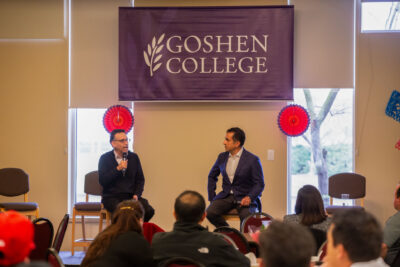Seventeen years later, the only persuasive speech that Suzanne Ehst remembers from teaching high school English was the one from a student holding a spoon in front of his face, trying to convince his audience he could bend it with his mind.
That student was Michael J. Sharp, more commonly known as M.J.Sharp, 34, was a 2001 graduate of Bethany Christian High School and a 2005 graduate of Eastern Mennonite University.
On March 27, Sharp’s body was found in a shallow grave in the Democratic Republic of the Congo and later identified through tests on March 28. Sharp was coordinator of the Group of Experts to the DRC, he and colleagues had been documenting human rights violations and monitoring U.N. Security Council sanctions violations.
The body of Sharp’s U.N. colleague, Zaida Catalan, was also found after unknown assailants kidnapped Sharp, Catalan, and four Congolese nationals on March 12. Before Sharp began working with the U.N. in 2015, he served for three years with Mennonite Central Committee as the Eastern Congo Coordinator.
“We knew, given his passion and training that he would live in dangerous parts of the world,” John Sharp, M.J.’s father, said. “We learned to live with that to a certain degree. We were always hoping and praying he would remain safe, but we knew danger and/or death could be a possibility.”
John is a professor of Bible and history at Hesston College, and his wife, Michele Miller Sharp, is a former physician assistant with Goshen Health. They knew the risks their son faced, but they always knew that he was following protocol.
“It helped to know that he was not reckless,” John said. “Knowing that he was careful and methodical gave us confidence that if it were up to him, he would always remain safe.”
But amidst the grief, the Sharps have found some comfort in the support pouring in from people all over the world.
“It’s been especially healing for us to hear from [his] colleagues that tell us how he did his work,” Michele said. “We’ve been so moved by people who talk about his kindness and gentleness.”
John is currently in the process of collecting stories of M.J. from his friends and colleagues.
“Learning about the respect his colleagues and friends had for him,” John said, “his kindness and humility in doing his work have been the most moving.”
Ehst, professor of education, taught M.J. at Bethany Christian. As one of the faculty sponsors of the Bethany class of 2001, Ehst is included in the group’s Facebook page, which has now turned into a space for classmates to share stories of M.J.
Whether it was a story of M.J. throwing fireworks off of a classmate’s house in the middle of the night, hiding under a teacher’s desk to make noises in the middle of pre-calculus or rewiring the school bell system so he could control it from his locker throughout the day, people remember him fondly.
“As I was grieving his passing,” Ehst said, “I was reading some of these stories and laughing out loud. He was so smart and good-hearted.”
A few years ago, Ehst got the chance to reconnect with M.J., then in his early 30s, and she found that his sense of humor hadn’t gone away.
“He had grown into some of this work,” she said, “yet his humor was still there, a driving way of how he related to people.”
Jason Samuel, professor of communication, knew M.J. through Waterford Mennonite Church.
“I don’t think that there can be a better example of Christian witness than to work for peace,” Samuel said, “to feel so strongly about it that you’re willing to risk and ultimately give your life.”
On Samuel’s office door are six photos of people he knows personally that “died before their time;” M.J. is one of them.
“The people on my door,” he said, “I had a personal relationship with. They’ve all influenced me in a way, big or small. I want to honor their memory.”
Honoring M.J.’s life and work is exactly what John and Michele want to do, especially now that their son can no longer speak for himself.
“We think his mission was so important” Michele said, “that we are using any opportunity to focus on the nonviolent, bridge-building conflict resolution style. It’s what we want to promote, and it’s somewhat therapeutic to do so.”
The Michael J. Sharp Memorial Fund has been created by MCC at the request of John and Michele for people to support MCC’s continuing work in Congo. Those interested in donating can visit donate.mcc.org for more information.
“We hope that this story can stimulate other people to consider nonviolent alternatives, to seek the training and to carry on this kind of work,” John said. “If we truly—as Mennonites—believe in peacemaking, peace building and nonviolence, then let’s do it. We hope many more would be inspired to do that because of this story.”

